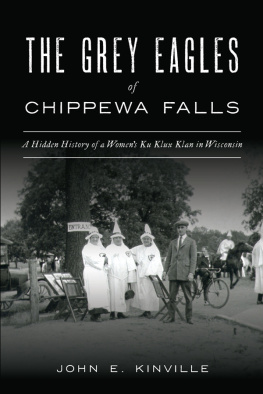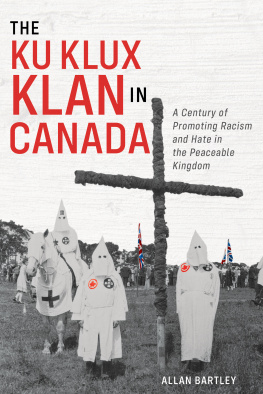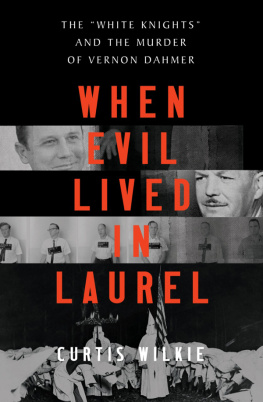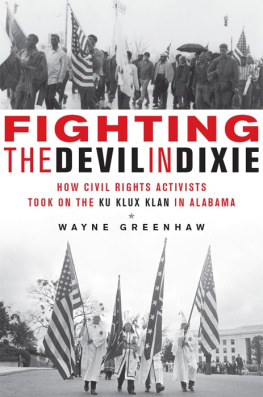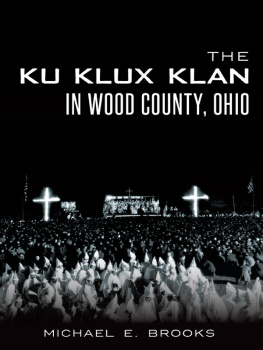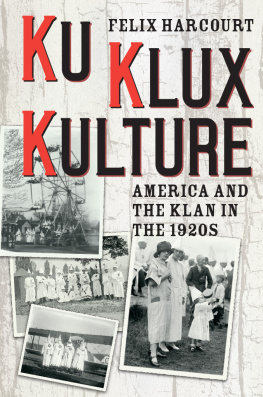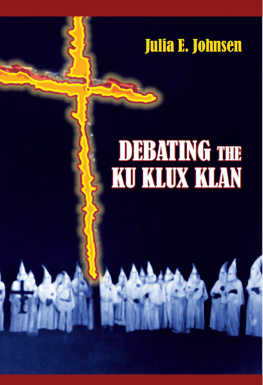THE INFORMANT
THE Informant
THE FBI, THE KU KLUX KLAN, AND THE MURDER OF VIOLA LIUZZO
GARY MAY

Published with assistance from the Louis Stern Memorial Fund.
Copyright 2005 by Gary May.
All rights reserved.
This book may not be reproduced, in whole or in part, including illustrations, in any form (beyond that copying permitted by Sections 107 and 108 of the U.S. Copyright Law and except by reviewers for the public press), without written permission from the publishers.
Set in Scala type by Duke & Company, Devon, Pennsylvania.
Printed in the United States of America.
Library of Congress Cataloging-in-Publication Data
May, Gary, 1944
The informant : the FBI, the Ku Klux Klan, and the murder of Viola Liuzzo / Gary May.
p. cm.
Includes bibliographical references and index.
ISBN 0-300-10635-1 (alk. paper)
1. Liuzzo, Viola, 1925-1965. 2. Rowe, Gary Thomas. 3. MurderAlabamaLowndes County. 4. Civil rights workersAlabamaBiography. 5. InformersAlabama Biography. 6. Ku Klux Klan (1915). 7. United States. Federal Bureau of Investigation. 8. Undercover operationsAlabama. 9. Selma-Montgomery Rights March, 1965. I. Title.
E185.98.L58M395 2005
323.092309073dc22
2005002067
A catalogue record for this book is available from the British Library.
The paper in this book meets the guidelines for permanence and durability of the Committee on Production Guidelines for Book Longevity of the Council on Library Resources.
10 9 8 7 6 5 4 3 2 1
In loving memory of Stuart Jerome, my uncle, who taught me that writing is all about storytelling. And for Morley and Donna, who were always there when we needed them. And for Archie, Mitch, and Darcy, my best friends.
PREFACE
IN MARCH 1965, a Detroit housewife and mother of five was murdered in Alabama; it became one of the most important but overlooked racial murders of the 1960s. Viola Liuzzo went to Selma to join thousands of her fellow citizens in the historic Voting Rights March. Late on the night of March 25, she was shot to death by a group of Alabama Klansmen, thereby becoming the only white woman to lose her life in the civil rights movement. Incredibly, the Klansmen were captured within twenty-four hours because one of them, Gary Thomas Rowe, Jr., was a secret FBI informant. Besides the personal consequences for her family and friends, Liuzzos murder had far-reaching national consequences. It shocked America and galvanized the civil rights movement, contributing to the enactment of one of the most important pieces of legislation in American history, the Voting Rights Act of 1965.
Her killing prompted President Lyndon B. Johnson to become personally involved in the case. In an act without precedent in the history of the presidency, he announced the arrest of Liuzzos killers over national television and warned Klansmen to get out of the Klan now and return to a decent societybefore it is too late.
But what perhaps gives the Liuzzo case its historical importance and even contemporary relevance is the light it sheds on the FBIs secret informant system, which continues to this day. Gary Thomas Rowe, Jr., was the FBIs most important informant in the Alabama Ku Klux Klan from 1960 to 1965, and besides being present in the car when the Klansmen shot Liuzzo, he was involved in a number of violent incidents in the history of the civil rights movement. To protect Rowes true identity and collect the information it wanted, the FBI allowed Rowe to attack blacks, Freedom Riders, and other civil rights workers without fear of arrest and prosecution. In effect, the FBI protected the very terrorists it hoped to destroy.
Today, the United States is engaged in a war against domestic and international terrorism, and, it is argued, one important weapon is informants who will penetrate terrorist groups and help prevent future violence. The experience of Gary Thomas Rowe suggests that the opposite can be true: In order to protect their cover, informants commit the very acts they are supposed to forestall and therefore make U.S. intelligence agencies complicit in these crimes.
Based on declassified FBI records, trial transcripts, and interviews with FBI agents, members of the Liuzzo family, and others involved in the case, this book is also the story of two extraordinary peopleGary Thomas Rowe, Jr., and Viola Liuzzo. Rowe, called Tommy by his friends, was a brawler, a liar, a womanizer, and perhaps a murderer, personally recruited by the FBI in 1960 to infiltrate the Alabama Klan. His enemies would later call him a maniac and a Judas goat who sold his soul for 30 pieces of silver. His admirers included J. Edgar Hoover, who, according to Rowe, once told him, Youre one of the greatest Americans this country has ever had. Later, however, Rowe came to believe that the FBI had betrayed him, and he publicly attacked the Bureau in interviews before congressional committees and on national television. My whole life was the FBI, he once said. I was a red, white, and blue flag. I gave my life for my country and got screwed.
Viola Liuzzo was equally controversial. To segregationists, she was an outside agitator, a drug addict who went to Alabama to sleep with black men. To feminists, she was a hero, a woman liberated before her time, willing to leave her five childrenthe youngest just six years oldto fight for civil rights. Her colleagues in that struggle consider her a martyr who gave her life for justice; she is honored on plaques bearing her name at the site where she died and many other places where the civil rights movement is commemorated.
All too often, both Rowe and Liuzzo have been wrenched from the context of their lives to further political or legal agendas, and seeking the truth about them is one of this books goals. They are traditionally seen as polar opposites, but in fact they shared a number of common experiences: Both grew up in the South in near poverty; both left school in the eighth grade; both were married multiple times; both searched for personal fulfillment in self-created crusades. Rowe saw himself not as an informer, a snitch, but as an undercover man working inside the Klan for the FBI and his country. Liuzzo devoted her life to attacking injustice wherever she saw itin the towns and cities of her youth and later in the hospitals where she briefly worked, in the Detroit school system where her children were educated, and finally in Alabama, where her people were denied the right to vote. The two never met, but their collision on a rainy night in rural Alabama changed their lives forever.
ACKNOWLEDGMENTS
IN MARCH 2002, I had the pleasure of meeting Diane McWhorter, author of Carry Me Home: Birmingham, Alabama, the Climactic Battle of the Civil Rights Revolution. Her book discussed, in part, the early career of FBI informant Gary Thomas Rowe, so we had a lot to talk about. When she had to leave, I asked her to inscribe my copy of her book. She wrote: To Gary MayFellow Stalker of the late, great Gary Thomas Rowe. Maybe well yet find him ...
After five years of stalking Rowe, Im not sure that its possible for anyone to capture him with total accuracy, but I tried. Many people helped me in that quest. My greatest debt is to Dean A. Robb, Esquire, the Liuzzo family attorney, who generously gave me access to his records and allowed me to quote from them. If all attorneys were as selfless as Mr. Robb, the profession would not be held in such low esteem. This book may have been written, but it would not have been published without the wise counsel of John W. Wright, my agent. He advised me on how to navigate the tricky shoals that are the modern publishing world and eventually steered me to a safe harbor at Yale University Press. There, I found Lara Heimert, every writers dream editor. She was brilliant and supportive, and this book has profited immeasurably from the care she devoted to it. Thanks, too, to her colleagues Phillip King, Molly Egland, Keith Condon, Mary Pasti, Susan Laity, Christina Coffin, Liz Pelton, and especially the wonderful Jessie Dolch, superb practitioner of an ancient art today rarely seencopyediting. Her hard work is evident on every page of this book. Im also very fortunate that Yale sent the manuscript to Professor Richard Gid Powers to review. The preeminent historian of the FBI, Professor Powerss suggestions forced me to examine more clearly the central questions raised by Rowes relationship with the FBI. I also often turned to Diane McWhorter for information about Birmingham, and she was always kind enough to come to my aid.


